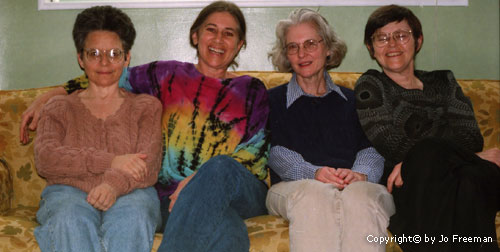In Memory of Shulamith Firestone
by Jo Freeman
Posted at n + one September 26, 2012
and printed in issue #15 Winter 2013 on pp. 125-6.
I first met Shulie over Labor Day Weekend in 1967, at the National Conference for New Politics—an unsuccessful attempt to unite the organized left behind a presidential ticket that would campaign against the war in Viet Nam. A couple of women who were not themselves part of the left had persuaded the conference organizers to give them some space for a women’s caucus. Black caucuses at such meetings were common and accepted, but one for women was by itself radical.
Shulie was one of about four dozen women who met daily to hammer out a resolution that called attention to women’s issues—equal pay, childcare, abortion on demand, and other things that today don’t seem very radical. She didn’t say much, but what she did say stuck in my mind. I would now characterize her views as radical feminism uncontaminated by left-wing rhetoric—something one didn’t encounter much of in those days.
 Shulamith Firestore, Carol Giardina, Amy Hackett and Jo Freeman on May 10, 1998 |
|---|
When we took the women’s caucus resolution to the resolutions committee we were told that we were too late: the agenda already had a resolution on women, and there was only time for one. That resolution was written by members of Women Strike for Peace, none of whom had attended the women’s caucus; it was about peace, not women. I walked out mad. I probably would have gone home had I not run into Shulie. At first, she didn’t believe what I told her. But after she found out for herself, she was angrier than I was.
Alone, neither of us would have done anything, but together we fed on each other’s rage. We decided to propose a substitute resolution when the Women Strike for Peace language was read for discussion before voting the next day. We stayed up all night revising the women’s caucus resolution. The more we talked, the more radical it got.
We printed copies and passed them out. By the time the agenda reached the women’s resolution, a handful of us stood at the microphone, our hands stretched high, waiting to be recognized to propose our substitute. After reading the “women’s” resolution, meeting chair William Pepper didn’t recognize any of us. “All in favor, all opposed, motion passed,” he said. “Next resolution.”
As we stood there in shock, a young man pushed his way in front of us. He was instantly recognized by the chair. Turning to face the crowded room, the young man said, “Ladies and Gentlemen, I want to speak for the forgotten American, the American Indian.” Infuriated at being “forgotten,” we rushed the podium, where the men only laughed. When Shulie reached Pepper, he literally patted her on the head. “Cool down, little girl,” he said. “We have more important things to do here than talk about women’s problems.”
Shulie didn’t cool down, and neither did I. We put together a list of every woman we knew who might be interested in working on women’s issues and invited them to a meeting at my Chicago apartment. What came to be called the West Side Group met for seven months. Shulie only stayed a month before moving to New York; her sister Laya took her place in our group.
Shulie took with her the names of some New York women interested in women’s issues. With them, she founded the first women’s liberation groups in New York.
For the next couple years we stayed loosely in touch. When The Dialectic of Sex was published in 1970, she inscribed the copy she gave me. “To Jo: With Whom It All Began.”
By 1975, Shulie had faded away. I had to track her down to give her a copy of my first book when it was published that year. Years later, I was told by others of her mental illness and its effects, but I didn’t see it myself.
We reconnected for a few years when her next book, Airless Spaces, was published in 1998. She invited several of her old friends to celebrate. She seemed fine, but others told me that she wasn’t.
The last time I saw Shulie was in 2000, at the book party Gloria Steinem hosted for my latest book. Even though they were both early feminists living in the same city, they had never met. Gloria told her how honored she was to meet the author of such an important early feminist book. They hugged, and they talked.
Shulie and I managed to stay in touch through 2003. Afterward, I only got her voicemail when I called, and no reply to my emails. Carol Giardina and Kathie Sarachild kept me apprised of her ups and downs through 2007. The next time I heard of Shulie was when I got word of her death.
Thinking back on those years and Shulie’s contribution to the women’s liberation movement, I see Shulie as a shooting star. She flashed brightly across the midnight sky. And then she disappeared.
To Top
Books by Jo | What's New | About Jo | Photos | Political Buttons
Home | Search | Links | Contact Jo | Articles by Jo